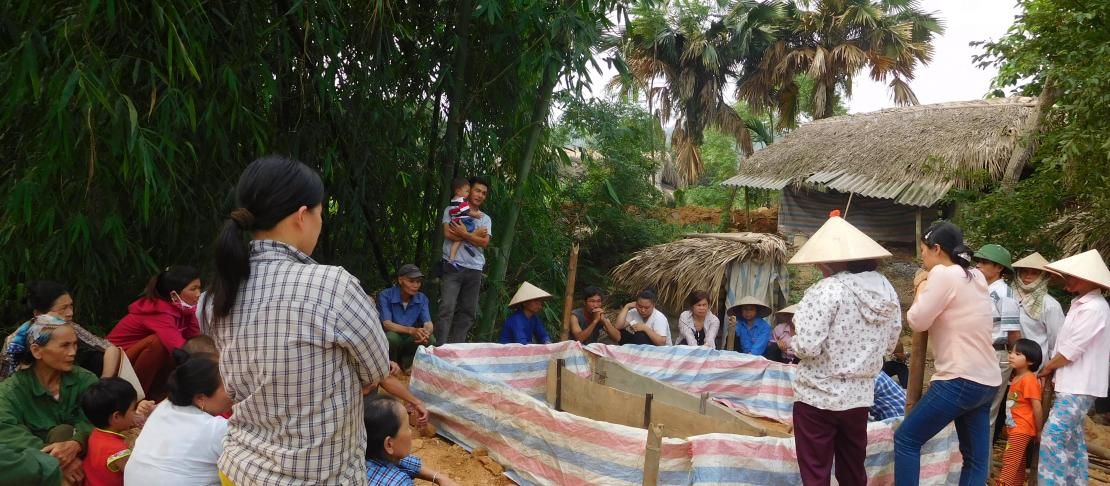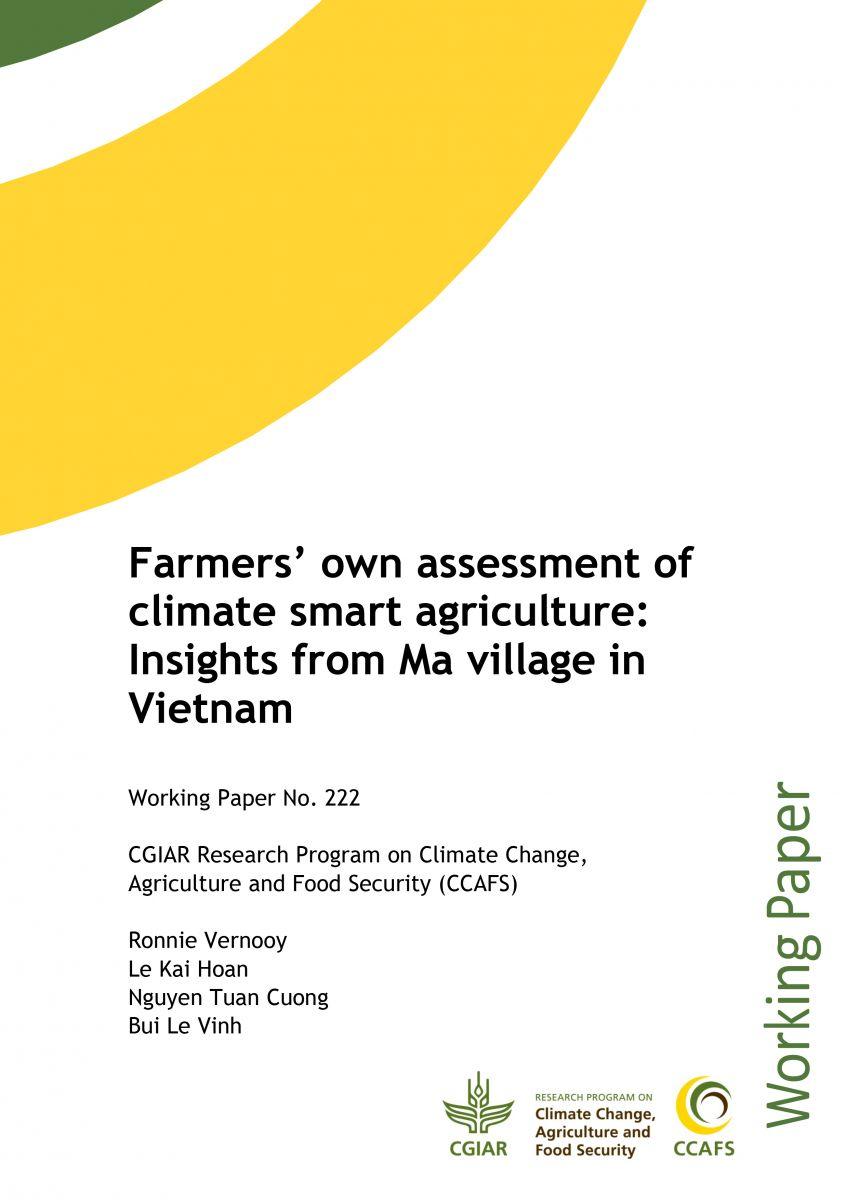Perceptions from the farm: farmer assessments of adopted climate-smart technologies and practices

In Ma Village, farmers assess the climate-smart agriculture technologies and practices they have adopted through non-quantitative means such as direct observation, “before and after” comparison, and neighbor comparison.
A recent study of farmer’s assessment of climate-smart agriculture (CSA) innovations is part of the project 'Integrated agricultural technologies for enhanced adaptive capacity and resilient livelihoods in Climate-Smart Villages (CSVs) of Southeast Asia'. Under the CGIAR Research Program on Climate Change, Agriculture, and Food Security in Southeast Asia (CCAFS SEA), the project is led by the International Center for Tropical Agriculture (CIAT), and implemented with the support of Bioversity International, World Agroforestry Centre (ICRAF), International Rice Research Institute (IRRI), International Water Management Institute (IWMI), and WorldFish, and a number of national partners.
The working paper titled Farmers’ own assessment of climate smart agriculture: Insights from Ma village in Vietnam looked into how climate-smart agriculture (CSA) scientists tracked the progress of the project, what outcome indicators were set by the scientists to measure the impact of the project, and how farmers assess their own exposure to the CSA technologies and practices they adopted. The paper concludes that CSA scientists must devise a more effective plan to assess the impact of the project to promote a wide-scale adoption of CSA technologies and practices.
Improving adaptive capacity, strengthening farmer resiliency
Since its launch in 2015, the project is providing options for farmers to strengthen their capacities and resilience to adapt to the changing global climate. It specifically integrates CSA technologies and practices to improve farm productivity and food security while conserving natural resources. Through this integration, it is expected that farm yields and eventually, farmers’ income, will improve.
The CSA technologies and practices being adopted in Ma Village are the following:
- Cassava-grass strips-cowpea intercropping on sloping lands
- Livestock waste management through vermiculture composting
- Biological bedding for poultry
- Living pen and cut and carry grass production for goat raising
- Crop residue management
- Integrated home gardening
- Climate-smart rice production
- Acacia livelihood development
These are all valuable to farming activities such as animal raising and rice production as they maximize available farming inputs while increasing farm productivity. For instance, vermiculture composting utilizes livestock manure and earth worms to produce good bio-fertilizers for crops and vegetables, and provides extra feed for chickens.
Another practice being adopted in Ma Village is an intercropping system to mitigate the effects of mono-cropped cassava—known as the primary factor of soil erosion on slopping lands. This system involves planting of gross strips to shorten the length of erosive slopes then intercropping leguminous cover crops with cassava to improve soil fertility.
Each of these technologies and practices has its own outcome indicators that would be measured by scientists.
Monitoring and evaluating
In early 2015, a monitoring and evaluation (M&E) plan was drafted to track the progress of the project. The M&E plan is divided into two aspects: technical and social. On one hand, the technical aspect refers to the biophysical results, which were collected to know the impact of CSA technologies and practices to climate change adaptation of Ma village farmers. On the other hand, the social aspect pertains to the experiences of the farmers as they are exposed to these technologies and practices.
The first M&E was conducted late 2016 in Ma Village to assess the social dimension of the project. Qualitative methods such as field observations and conversations were employed to elicit responses from the farmers. Based on the initial M&E report, farmers are satisfied with the CSA technologies and practices they had adopted. They added that their environment seems cleaner than before with the adoption of certain practices that utilize livestock manure.
However, these assessments lack scientific bases. For instance, greenhouse gas emissions and soil fertility were not measured to reinforce the assessments of the farmers. CSA scientists also have yet to conduct deeper data gathering methods that will inform them about how farmers came up with their assessments. A second M&E was conducted then to inform the scientists of the farmers’ own methodologies. The working paper detailed the purposes, time of adoption and management of the technology/practice, and their current results.
Based on the farmers’ assessments, the CSA technologies and practices are helping them improve farm productivity and as a result, their income generation too. However, the scientists who forwarded these technologies and practices had difficulties confirming these assessments despite a guiding analytical framework in place. Moreover, the farmers based their assessments on observation only—observation on their own crops and those of their neighbors. Without quantitative data to back up the farmers’ assessments, the technologies and practices cannot be fully implemented on a wider scale.
The challenge now is for CSA scientists to come up with a framework that will help them monitor and evaluate the initiatives that they introduce to CSVs.
Download the working paper: Vernooy, R., Le Kai Hoan, Nguyen Tuan Cuong, Bui Le Vinh. 2018. Farmers’ own assessment of climate smart agriculture: Insights from Ma village in Vietnam. CCAFS Working Paper no. 222. Wageningen, the Netherlands: CGIAR Research Program on Climate Change, Agriculture and Food Security (CCAFS).
Read more:
- CCAFS blog: Getting the message across: Communicating sustainable farming practices to improve adoption in Vietnam
- CCAFS blog: Highly adaptive and resilient villages in Southeast Asia
- CCAFS blog: Farmers in Ma Village to lead in outscaling climate-smart agriculture
Renz Louie Celeridad is the junior communications specialist for the World Agroforestry Centre Philippines. He also works as communication consultant for CCAFS SEA program.




